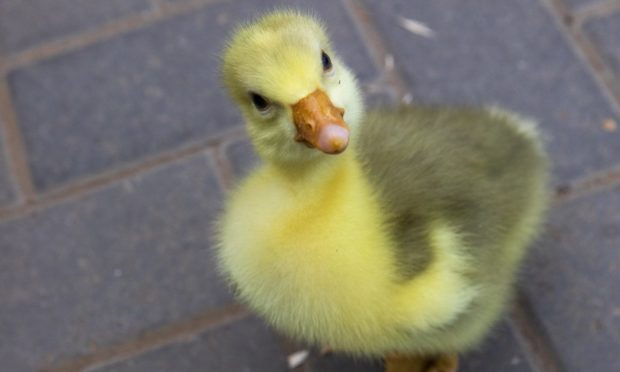An “incredibly rare” Shetland goose has been born at a Scottish wildlife centre.
The tiny gosling was born on May 16 at the Almond Valley Heritage Centre, in West Lothian, and is now being hand-reared by staff.
The centre has two breeding pairs, with the females normally producing eight to 10 eggs.
However, this year one of the mums had only two eggs and just one hatched – making it even more valuable to the conservation of the rare breed, according to farm manager Craig Holmes.
‘It’s really important to boost their numbers’
Shetland geese are one of the rarest domestic geese in the UK and are currently listed as a priority breed by the Rare Breed Survival Trust (RBST).
Experts at the British Waterfowl Association reckon there are as few as 200 individuals remaining in the country.
Mr Holmes said: “Shetland geese are incredibly rare and it’s really important to try and boost their numbers as much as we can.
“There are a lot of native commercial livestock that gets overlooked, just because they are a cow, a sheep or a goose, and when you think of conservation, you normally think of wild animals such as pandas and tigers.
“But these animals are just as important and in a lot of the cases – rarer.”
Efforts to preserve rare breed poultry
The “incredibly cute” gosling is currently cared for by staff – with the hope that mum Willow will be able to nest again this year.
As this is the only chick to hatch so far, the team at the centre has gone above and beyond to make sure the gosling survives and is well-looked after.
Mr Holmes said: “We would normally take the eggs off the female to artificially incubate them to protect them from predators or from getting broken, but as one of the mums only had two, we left her to sit on them.
“One hatched out and we took that gosling away for hand rearing, as if the mum had reared the gosling she might not have nested again.
“Because the numbers are so low, each individual is really valuable in the way of conservation, so we are hoping that she will nest again, lay more eggs and produce more goslings.
“The one we’ve got now is growing quick and it’s living with a couple of ducklings that hatched on the same day, so they’re keeping it company and showing it how to be a water bird.
“And it’s a double win really, because we are boosting the numbers of rare poultry, but also giving visitors the chance to see them – they are very cute and our visitors love them.”
